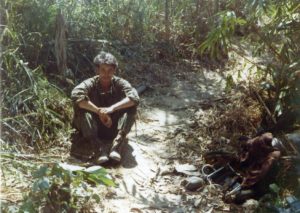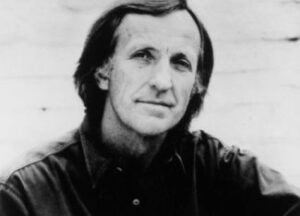Every so often Medic receives email from teachers, students, from sympathetic vets. It’s always a pleasure to answer their questions. Though I did not know it, this particular email, which arrived on 10 December 2019, held special significance.
My name is Clayton Walker. I am a twenty two year old studying  English-Teacher Education at North Carolina State University. As requirement for my degree, I teach a 9th grade English class at one of the neighboring high schools. I also moonlight as a tattoo artist, tattooing walk-ins late into the night.
English-Teacher Education at North Carolina State University. As requirement for my degree, I teach a 9th grade English class at one of the neighboring high schools. I also moonlight as a tattoo artist, tattooing walk-ins late into the night.
I have been researching and reading the literature of the war for several years now, and more so than any other, your work has profoundly affected me. Recently, I began a unit on Vietnam Lit for my 9th graders.
I began the week long unit with several poems by W.D. Ehrhart, and concluded with three excerpts from your work, Dreams, Vietnam. We read 28 June 70, 7 July 80, and 3 November 2001.
Before introducing you to the students, I began by discussing the false face ceremonies of the Iroquois. Among them, the worst dream that one could have was to come into contact with a flying head. If you dreamt of a flying head, you were essentially marked for death. The only way to uplift the curse was to march into the forest, carve the features of the face you saw into a living basswood tree, and then don the  mask that you created. Literally, the dreamer had to become their own demon in order for survival.
mask that you created. Literally, the dreamer had to become their own demon in order for survival.
Once we had finished reading your dream excerpts I handed the students whiteboard markers and asked, “Having seen his dreams, how would you define the features of his dream mask?” One by one the students walked to the board, adding a nose, a mouth, an pair of eyebrows.
The students constructed a worn-out, almost tired figure. A five o clock shadow was present, and there were bags under his eyes, however he was looking forward. Towards the future, towards hope.
I hope to hear from you soon.
Your Friend,
Clayton W.
* * * * * *
Having read Clayton’s email twice, that night Medic had the following dream, which mentions my poet friend Bruce Weigl. I emailed it to him, beneath Clayton’s remarkable letter:
I’m in a large auditorium sitting next to Bruce. Up on the stage, Jay Denburg, a childhood friend, reads a long continuous poem, quickly, and well. It’s part hippie, part beat, and reminds me of Bob Dylan. When Jay finishes the poem he asks to continue, and does so, to loud applause. I look around. There are thousands of people in the audience. I’m disappointed. I thought this was an open mic. I had brought something to read. I turn to Bruce. We’re wedged together. I’m right up against him. He’s so much bigger than me I’m being squished. But it’s a protective squish. Like penguins. As if we were father and son. Bruce asks, “Have you heard of General Lawrence Kelb?” I say “Yes.” I’m thinking, “Uh oh. This is it. Bruce is getting transferred. I’ll never see him again.” Bruce says he has something to tell me, and that he’s sorry for what’s happened. He had lent or given or somehow got my book (How Stevie Nearly Lost  the War, with it’s orange and black cover of Greek soldiers playing at dice), to General Kern, who has stolen the cover art for his own book. Bruce says he’s sorry about that. Even with copyright it won’t make much difference. The general has power. As I wake from the dream I remind myself that a photo of me sitting on a well-used trail is incorporated into the cover. This means I can prove the cover is mine. Waking, I chose what words to say. “I love you, Bruce. Don’t worry.” I feel good about saying that. It feels right.
the War, with it’s orange and black cover of Greek soldiers playing at dice), to General Kern, who has stolen the cover art for his own book. Bruce says he’s sorry about that. Even with copyright it won’t make much difference. The general has power. As I wake from the dream I remind myself that a photo of me sitting on a well-used trail is incorporated into the cover. This means I can prove the cover is mine. Waking, I chose what words to say. “I love you, Bruce. Don’t worry.” I feel good about saying that. It feels right.
Your friend,
Marc L
______________
Clayton Walker has taught 9th grade English, and worked as a tattoo artist in Raleigh, NC. Currently, he is studying towards his MFA at North Carolina State University and plays drums in a punk-rock band. He aspires to teach writing on a college level. You can reach him at ccwalke3@ncsu.edu.
—–
Learn about Apologies To the Iroquois, by Edmund Wilson, here and here.
Learn more about Vietnam veteran and poet Bruce Weigl here.

Lessons From the Iroquois
Every so often Medic receives email from teachers, students, from sympathetic vets. It’s always a pleasure to answer their questions. Though I did not know it, this particular email, which arrived on 10 December 2019, held special significance.
My name is Clayton Walker. I am a twenty two year old studying English-Teacher Education at North Carolina State University. As requirement for my degree, I teach a 9th grade English class at one of the neighboring high schools. I also moonlight as a tattoo artist, tattooing walk-ins late into the night.
English-Teacher Education at North Carolina State University. As requirement for my degree, I teach a 9th grade English class at one of the neighboring high schools. I also moonlight as a tattoo artist, tattooing walk-ins late into the night.
I have been researching and reading the literature of the war for several years now, and more so than any other, your work has profoundly affected me. Recently, I began a unit on Vietnam Lit for my 9th graders.
I began the week long unit with several poems by W.D. Ehrhart, and concluded with three excerpts from your work, Dreams, Vietnam. We read 28 June 70, 7 July 80, and 3 November 2001.
Before introducing you to the students, I began by discussing the false face ceremonies of the Iroquois. Among them, the worst dream that one could have was to come into contact with a flying head. If you dreamt of a flying head, you were essentially marked for death. The only way to uplift the curse was to march into the forest, carve the features of the face you saw into a living basswood tree, and then don the mask that you created. Literally, the dreamer had to become their own demon in order for survival.
mask that you created. Literally, the dreamer had to become their own demon in order for survival.
Once we had finished reading your dream excerpts I handed the students whiteboard markers and asked, “Having seen his dreams, how would you define the features of his dream mask?” One by one the students walked to the board, adding a nose, a mouth, an pair of eyebrows.
The students constructed a worn-out, almost tired figure. A five o clock shadow was present, and there were bags under his eyes, however he was looking forward. Towards the future, towards hope.
I hope to hear from you soon.
Your Friend,
Clayton W.
* * * * * *
Having read Clayton’s email twice, that night Medic had the following dream, which mentions my poet friend Bruce Weigl. I emailed it to him, beneath Clayton’s remarkable letter:
I’m in a large auditorium sitting next to Bruce. Up on the stage, Jay Denburg, a childhood friend, reads a long continuous poem, quickly, and well. It’s part hippie, part beat, and reminds me of Bob Dylan. When Jay finishes the poem he asks to continue, and does so, to loud applause. I look around. There are thousands of people in the audience. I’m disappointed. I thought this was an open mic. I had brought something to read. I turn to Bruce. We’re wedged together. I’m right up against him. He’s so much bigger than me I’m being squished. But it’s a protective squish. Like penguins. As if we were father and son. Bruce asks, “Have you heard of General Lawrence Kelb?” I say “Yes.” I’m thinking, “Uh oh. This is it. Bruce is getting transferred. I’ll never see him again.” Bruce says he has something to tell me, and that he’s sorry for what’s happened. He had lent or given or somehow got my book (How Stevie Nearly Lost the War, with it’s orange and black cover of Greek soldiers playing at dice), to General Kern, who has stolen the cover art for his own book. Bruce says he’s sorry about that. Even with copyright it won’t make much difference. The general has power. As I wake from the dream I remind myself that a photo of me sitting on a well-used trail is incorporated into the cover. This means I can prove the cover is mine. Waking, I chose what words to say. “I love you, Bruce. Don’t worry.” I feel good about saying that. It feels right.
the War, with it’s orange and black cover of Greek soldiers playing at dice), to General Kern, who has stolen the cover art for his own book. Bruce says he’s sorry about that. Even with copyright it won’t make much difference. The general has power. As I wake from the dream I remind myself that a photo of me sitting on a well-used trail is incorporated into the cover. This means I can prove the cover is mine. Waking, I chose what words to say. “I love you, Bruce. Don’t worry.” I feel good about saying that. It feels right.
Your friend,
Marc L
______________
Clayton Walker has taught 9th grade English, and worked as a tattoo artist in Raleigh, NC. Currently, he is studying towards his MFA at North Carolina State University and plays drums in a punk-rock band. He aspires to teach writing on a college level. You can reach him at ccwalke3@ncsu.edu.
—–
Learn about Apologies To the Iroquois, by Edmund Wilson, here and here.
Learn more about Vietnam veteran and poet Bruce Weigl here.